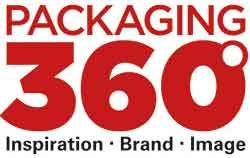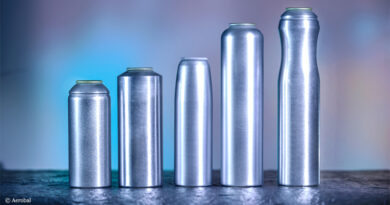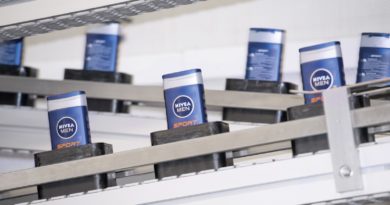New products from plastic waste
More and more companies in the plastics industry are working to improve the recyclability of plastics and are thus contributing to the establishment of a recycling economy. At the end of 2018, the company used pilot quantities of pyrolysis oil obtained from plastic waste as a raw material in production for the first time.
In the run-up to “K 2019”, the world’s largest trade fair for the plastics and rubber industry, four BASF customers presented the first prototypes produced during the pilot phase of the project.
Jaguar Land Rover (JLR), a leading automotive manufacturer, developed a plastic assembly carrier prototype for its first electric SUV “I-Pace” made of Ultramid B3WG6 Ccycled Black 00564. BASF’s plastic Ultramid is based on polyamides PA6, PA66 and various copolyamides such as PA66/6. “As part of our commitment to accelerate closed-loop production throughout our entire production process, we are always looking for technological innovations that help us reduce waste,” says Craig Woodburn, Global Environmental Compliance Manager at JLR. “The ability to produce safe quality parts from consumer waste through the ChemCycling process is an important step toward our goal of a waste-free future.
Storopack, a globally active company for protective packaging and technical mouldings, produced insulating packaging for temperature-sensitive pharmaceutical products, boxes for transporting fresh fish and protective packaging for electrical appliances made of polystyrene P Ccycled. “We were particularly convinced that Styropor P Ccycled can be used in food packaging. Styropor can already be recycled in various ways, and ChemCycling can further increase the proportion of recycled polystyrene,” says Storopack Managing Director Hermann Reichenecker. Storopack is thus breaking new ground in recycling management together with BASF.
Südpack, a leading producer of film packaging in Europe, produced a polyamide film and a polyethylene film that were processed into a specially sealed mozzarella packaging. Multilayer packaging has so far been regarded as having limited recyclability. “Film packaging has an important task to fulfil: Product protection, hygiene and durability, and this with minimum use of plastics. They therefore consist of several materials and layers with different properties and barriers. Innovations such as ChemCycling bring us closer to solving the problems of the recyclability of flexible packaging,” says Johannes Remmele, Managing Director of Südpack.
Schneider Electric, a leader in digital transformation in energy management and automation, manufactured a circuit breaker from chemically recycled Ultramid. “Even when using secondary raw materials such as recycled plastics, our demanding quality standards as well as the strict standards and guidelines of the industry must be met. We rely on BASF’s expertise to demonstrate the overall advantages of the process in terms of sustainability and to keep costs attractive. We hope that this test with BASF will open up new opportunities for us to innovate in recycling in energy management and distribution,” said Xavier Houot, Senior Vice President Group Environment, Safety, Real Estate, Schneider Electric.
ADVERTISEMENT
 At FachPack you will find exhibitors with the right innovations from the packaging process chain. Meet these companies with innovations on the subject of plastics. More information can be found here.
At FachPack you will find exhibitors with the right innovations from the packaging process chain. Meet these companies with innovations on the subject of plastics. More information can be found here.“The pilot projects with customers from various industries show that products based on chemically recycled raw materials have the same high quality and performance as products made of virgin material. ChemCycling, in which the proportion of recycled material is mathematically assigned to the end product via the mass balance approach, can help our customers achieve their sustainability goals,” says Jürgen Becky, Senior Vice President Performance Materials. Certified products are marked with the addition “Ccycled”. The prototypes now presented are part of the ongoing pilot phase of the ChemCycling project.
Increased recycling possible
“With the ChemCycling project, BASF has set itself the goal of processing pyrolysis oil from plastic waste that is currently not recycled, such as mixed or contaminated plastics. If the project can be developed to market maturity, ChemCycling can contribute to solving the plastic waste problem as an innovative addition to existing recycling and reutilization processes,” says Stefan Gräter, head of the ChemCycling project at BASF.
From the pilot phase to market maturity, however, various aspects still need to be clarified. The existing technologies for converting plastic waste into recycled raw materials must be further developed and adapted for use on a large industrial scale to ensure a consistently high quality of the pyrolysis oil. BASF is currently examining various options for supplying the company’s production Verbund with commercial quantities of pyrolysis oil in the long term. In addition to technological aspects, economic aspects also play a role. In order for chemical recycling to be accepted in the market, regulatory authorities must also officially recognize the process as recycling. Within this framework, they must define how chemical recycling and mass balance approaches can contribute to the fulfilment of legal recycling quotas.
“Our ChemCycling project is a good example of how BASF is working with partners to find solutions to the key challenges of the 21st century,” explains Dr. Andreas Kicherer, sustainability expert at BASF. In addition to ChemCycling, BASF is involved in many other projects and initiatives to strengthen the idea of recycling management and to prevent plastics from being released into the environment.




